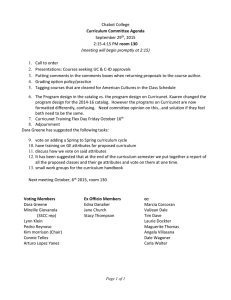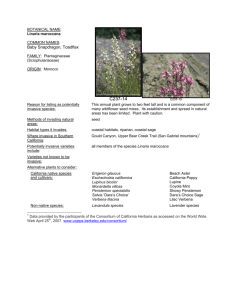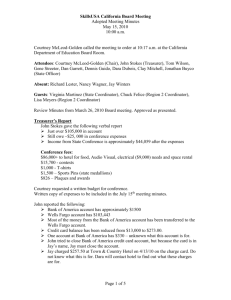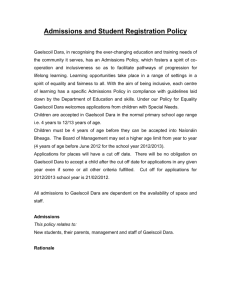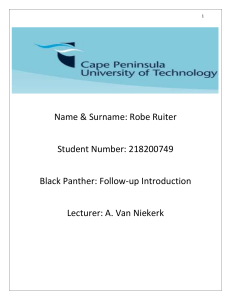USING ENGLISH IN THE CLASSROOM (1)
advertisement
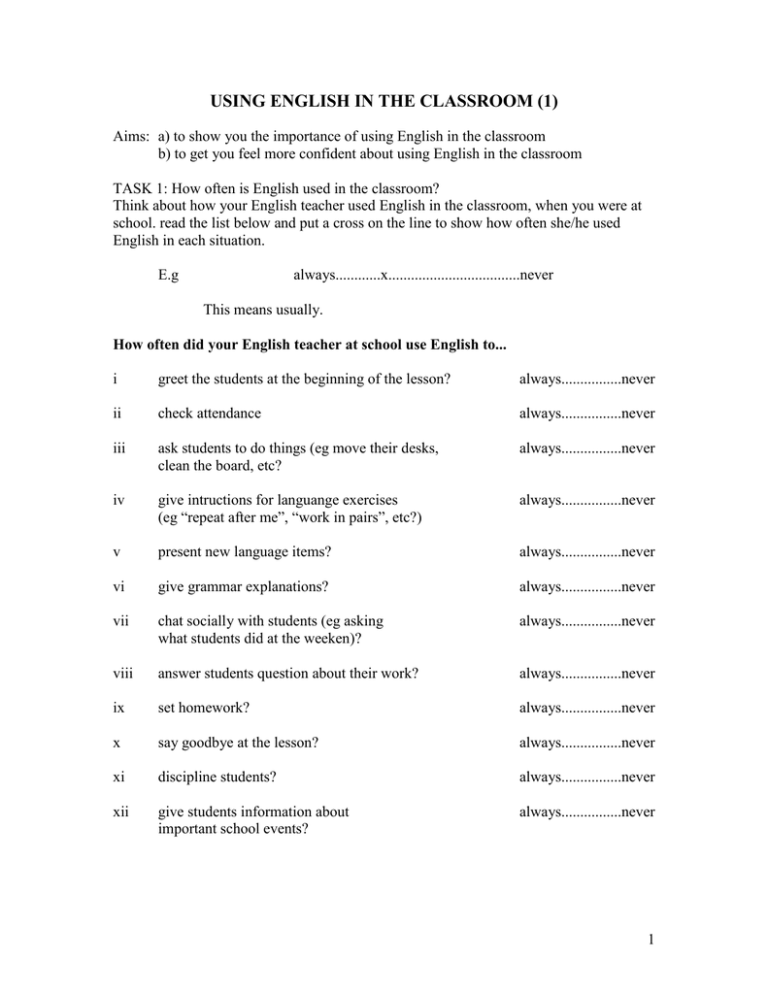
USING ENGLISH IN THE CLASSROOM (1) Aims: a) to show you the importance of using English in the classroom b) to get you feel more confident about using English in the classroom TASK 1: How often is English used in the classroom? Think about how your English teacher used English in the classroom, when you were at school. read the list below and put a cross on the line to show how often she/he used English in each situation. E.g always............x...................................never This means usually. How often did your English teacher at school use English to... i greet the students at the beginning of the lesson? always................never ii check attendance always................never iii ask students to do things (eg move their desks, clean the board, etc? always................never iv give intructions for languange exercises (eg “repeat after me”, “work in pairs”, etc?) always................never v present new language items? always................never vi give grammar explanations? always................never vii chat socially with students (eg asking what students did at the weeken)? always................never viii answer students question about their work? always................never ix set homework? always................never x say goodbye at the lesson? always................never xi discipline students? always................never xii give students information about important school events? always................never 1 TASK 2: Problems of using English in the classroom, and solutions Read the conversation below. What are the problems that Dara is having, and what advice does Sichan give him? What advice would you give him? A Conversation in the Staff Room Sichan : Dara : Sichan : Dara : Sichan : Dara : Sichan : Dara : Sichan : Dara : Sichan : Dara : Sichan : Hello, Dara. What’s the matter? Why do you look so miserable? I’m really depressed, that’s why. My English classes are giving me a real headache. But why? Well, when I start teaching English, it takes me twice as long to get the students to understand what I’m saying - it’s so much quicker to translate into Indonesian. When the students finally understand what I’m saying they don’t want to say anything to me in English. They’re so afraid of making mistakes. Well, I used to have the same problem, but I don’t anymore. I tried to make my lesson interesting and fun so thestudents would want learn English. Next time you teach, try to use mime and gestures, use your hands a lot to help them understand when you speak in English. Also, remember that they are learning english, so use short, simple sentences. But why don’t they say anything, even when they have understood me? How can I get them to talk? Well, you need to encourage the students more. Do you praise them when they get something right, or do you just correct them when they get something wrong? It’s my job to correct them, so of course I correct them when they get something wrong. Yes I know, but it’s not good for the students if you correct them all the time. It will make them nervous and so they won’t speak, beacause they will be afraid of making mistakes. Try to praise them more when they are correct, and instead of interrupting them all the time to correct them, you can write down some of their mistakes in a book, and look at all the mistakes at the end of the lesson, or in another lesson. I haven’t tried that. It sounds like a good idea. But there’s still a problem with timing. There never seems to be enough time in lesson to let the students speak a lot. Perhaps you are speaking too much. remember that you already know English and that they need to practise English. You don’t! My English isn’t good either. That’s why I prefer to translate everything into Indonesian. I’m afraid that some of the students know more than me and will laugh at me. Well, the first thing you have to do is to stop thinking like that, because it isn’t true. Next, if you want to improve your English, start doing some self 2 Dara : Sichan : Dara : study. Use the library/resouurce centre at British Council, and borrow the books. Speak to your friends, and to the other English teachers in English. At my school. we meet once a week to discuss our lessons and to help each other with any problems, and we usually speak in English. What about the other teachers in your school? I’m afraid that the teachers of other subjects at my schooll will make fun of me. they’ll say things like, “Why do you use English all the time? You’re Indonesian!” They’ve never said to me at my school, but if they do, so what? tell them that you’re Indonesian, but you’re also an English teacher, and it’s your job to speak English and to get the students to speak English. Thanks, Sichan. I feel much better now. You’ve given me a lot of ideas to try. DARA’S PROBLEM SICHAN’S ADVICE MY GROUPS’S ADVICE 3 USING ENGLISH IN THE CLASSROOM (2) Aim: to introduce appropriate English phrases for you to use in the classroom. TASK 2: Appropriate phrases for particular situations Read through the list below and work, in your group, to think of things you could say in each situation. What would you say in these situations? 1) The students are being noisy. 2) You want someone to clean the board. 3) You want students to work in groups of four. 4) A student has forgotten her books. 5) You want each students to take a worksheet from the pile you are passing around the class. 6) One of the students is missing and you want to know where he is. 7) You wnt the class remember and tell you what they studied in last lesson.. 8) You want someone in the class to tell you the answer to a question. 9) You want someone in the class to explain what a new piece of vocabulary means to the others. 10) You want the students to concentrate on you. 4
